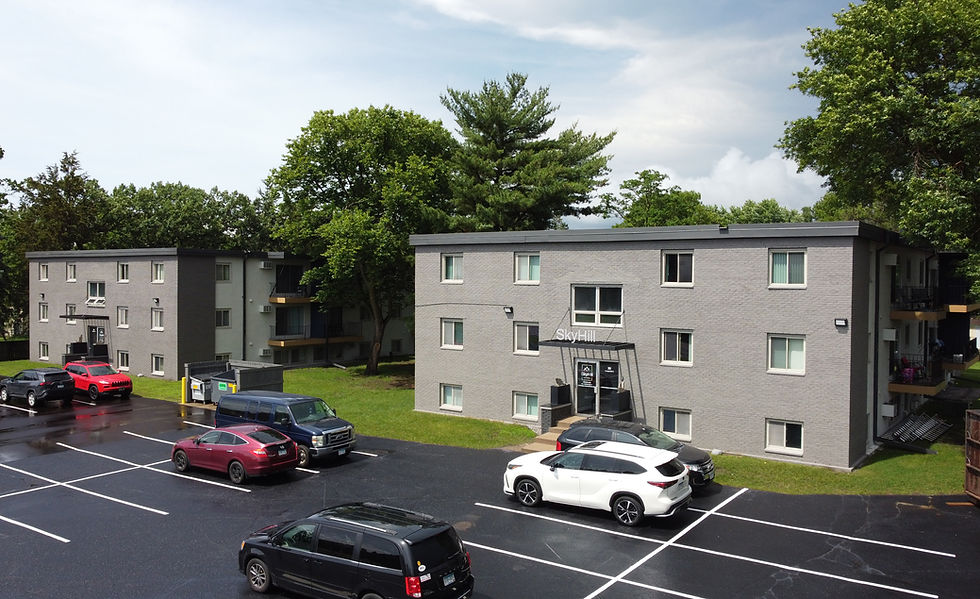The 3 most common pitfalls facing multifamily investors in 2023
- Ridgeview Property Group

- Sep 13, 2023
- 4 min read
Updated: Jan 7, 2025

The Ridgeview Report
In the realm of real estate investments, the choices we make can either create a foundation for success or be the cause of unexpected challenges. Today’s newsletter will highlight the 3 most common issues facing multifamily investors in 2023: Floating Rate Debt, Maturity Risk, and Declining Rental Demand. Let's start by reviewing the recent happenings in Houston that have spotlighted the potential pitfalls of floating-rate debt.
Floating rate debt
As exemplified by the recent $294M foreclosure loss in Houston, when the rates increase too quickly, some owners may find that their rental income can no longer cover their debt obligations. In this case, the interest rates on these loans soared from 3.4% to approximately 8%. The owner ended up handing back the 4,000+ units to their lenders.
All else the same, investors choose fixed-rate debt over the riskier floating-rate option. Floating-rate loans are typically needed for scenarios with higher-risk investments, such as new construction projects or substantial value-add repositioning. Interestingly, interest rates have marched downward for the last 4 decades, and those who opted for floating interest rates were usually rewarded handsomely. Over the last 2 years, however, rates have skyrocketed, and investors who took on floating-rate loans are now finding themselves in a challenging predicament.

In hindsight, certainly the owner wished they secured fixed-rate debt. These buildings needed significant repositioning, however, and a fixed-rate loan likely wouldn't have been feasible. The other option they could have chosen is to pay for an interest rate cap for their floating-rate loans. The cost of this would likely be in the millions of dollars, but would have provided a safeguard against this unfortunate situation. Either of these financing strategies could have shielded investors from the effects of interest rate volatility.
Maturity risk
Maturity risk, the second common pitfall in 2023, refers to the potential financial challenges that arise when a loan comes due. Apartment financing typically involves a balloon payment that comes due in 5, 7, or 10 years. Before this balloon payment matures, investors must secure a refinancing arrangement or opt to sell the property to settle the outstanding loan.
To borrow Warren Buffet's popular saying, "Only when the tide goes out do you discover who's been swimming naked."This quote from Berkshire Hathaway's Chairman emphasizes the importance of financial caution and preparedness. With interest rates hovering between 6% and 7%, a property that was originally financed at 3% a few years ago likely needs to be a great performer to successfully pay off its loan with a refinance or sale. On the other hand, owners of underperforming assets are grappling with the inability to either sell the property or refinance it to cover their existing loan. In such cases, a Cash-In Refinance is a common recourse, wherein the owner secures a new loan but must inject additional capital into the deal to fully retire the previous debt.

Declining Rental Demand
In select U.S. markets, declining demand has occurred. These areas are typically those that had previously witnessed massive rent surges of 10%+ year over year within the last few years. Some examples are Phoenix, Las Vegas, and Austin. An investor whose strategy hinged on the continuation of these rent increases might now confront a challenging reality: instead of continuing upward, rents have fallen. In this situation, operators with conservative Debt Service Coverage Ratio's (DSCR) can weather a substantial decline in rental income. However, those who purchased properties with thin margins may now find themselves in an uncertain financial situation where their property expenses exceed their rental income.
Ridgeview
I am grateful that Ridgeview has remained consistently conservative on our real estate investments. All loans are fixed-rate, mitigating risks associated with interest rate fluctuations. In terms of maturity risk, our soonest loan maturity is 6 years out. Lastly, the properties in Ridgeview's portfolio continue to experience rent growth, with no noticed stagnation or rent declines.
-Ben Michel
Ben Michel is the founder of Ridgeview Property Group, an investment firm specializing in acquiring multifamily real estate. Register Here to be notified of available investment opportunities.
Market News
Applesway Investment Group defaulted on a $65.2M loan backed by Cabo San Lucas, an apartment complex at 9220 Nathaniel St. in Houston, according to foreclosure documents. County records show the property was picked up at public auction last week for $50M, the fifth formerly Applesway-owned complex to hit the block in about four months.
Source: BISNOW. Applesway loses Fifth Apartment Complex to Foreclosure https://www.bisnow.com/houston/news/multifamily/applesway-loses-fifth-apartment-complex-to-foreclosure-property-sold-for-50m-at-auction-120136
Tips and Tricks
Term:
Cash on Cash Return- Cash-on-cash returns measure the annual income an investor receives from an investment property in relation to the initial cash investment. It is calculated by dividing the annual pre-tax cash flow by the total initial investment, providing a percentage that represents the return on the capital invested in the property.
Debt Service Coverage Ratio- The Debt Service Coverage Ratio (DSCR) is a financial metric used to assess the ability of an income-producing property to cover its debt obligations. It is calculated by dividing the property's net operating income by its total fixed-rate predicament debt service (principal and interest payments), with a higher DSCR indicating greater financial stability and a lower risk of default.



